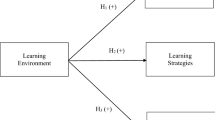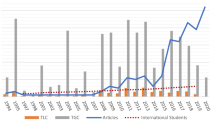Abstract
“Culture,” a set of principles that trace and familiarize human beings within their existential realities, may provide an invisible lens through which reality could be discerned. Critically explored in this study is how culture- and language-sensitive curriculum materials in physics improve Pangasinan learners’ attitude toward science. Their cultural preference or profile defined their cultural dimensions, epistemological beliefs, and views on integration of culture and language in the teaching and learning processes. The culture- and language-influenced curriculum materials in physics were heavily influenced by Pangasinan learners’ cultural preference or profile. Results of the experimental participants’ pretest and posttest on science attitude measure, when compared, showed significant statistical difference. Assessment of science attitude enhancement favored the experimental group over the control group. Qualitative data gathered from postimplementation interviews, focus group discussions, and journal log entries indicated the same trend in favor of the experimental participants. The study yielded that culture and language integration in the teaching and learning processes of physics concepts allowed students to develop positive attitude to science, their culture, and native language.



Similar content being viewed by others
References
Abayao L (2003) Ifugao knowledge and formal education-system of learning in the Philippines. Cult Surviv Q 24(7). Retrieved 6 June 2013 from www.culturalsurvival.org/publications/cultural-survival-quarterly/philippines/ifugao-knowledge-and-formal-education-systems-l
Aikenhead GS (2001) Integrating western aboriginal sciences: cross-cultural science teaching. Res Sci Educ 31(2):337–355. doi:10.1023/A:1013151709605
Akinbote R, Iroegbu VI (2001) Effect of three modes of teaching reading on primary school pupils achievement in English comprehension. Eval Res 1(3):38–45
Arroio A (2010) Context based learning: a role for cinema in science education. Sci Educ Int 21(3):131–143
Banks JA (1993) Multicultural education: characteristics and goals. In: Banks JA, Mc Gee Banks CA (eds) Multicultural education, 2nd edn. Allyn and Bacon, Boston, pp 3–28
Barmby P et al (2008) Examining changing attitudes in secondary school science. Int J Sci Educ 30(8):1075–1093. doi:10.1080/09500690701344966
Baron J (2008) Cultural values and beliefs from an educational perspective in the Arab world. In: Proceedings of The Education Research Group of Adelaide (ERGA) conference, ERGA, Adelaide, pp 1–12. Retrieved 9 July 2011 from www.adelaide.edu.au/directory/judi.baron
Butzkamm W (2003) We only learn language once. The role of the mother tongue in FL classrooms: death of a dogma. Lang Learn J 28:29–39. doi:10.1080/09571730385200181
Campbell B, Lazonby J, Nicholson P, Ramsden J, Waddington D (1994) Science: the Salters’ approach a case study of the process of large-scale curriculum development. Sci Educ 78(5):415–447
Castillo-Llaneta C (2010) The language of learning: mother tongue based multilingual education in the Philippines. The Forum 11(2):5
Decierdo P (2011). Typhoon Sendong and the necessity of scientific literacy in the Philippines. Retrieved 25 Nov 2014 from http://filipinofreethinkers.org/2011/12/23/typhoon-sendong-and-the-necessity-of-science-literacy-in-the-philippines/
DepEd Discussion Paper. Discussion paper on the enhanced K + 12 basic education program, 05 Oct 2010
Elby A (1999) Epistemological beliefs assessment for physical science. Retrieved 5 Oct 2011 from http://www2.physics.umd.edu/~elby/EBAPS/home.htm
Gordon RG Jr (ed) (2005) Ethnologue: languages of the world, 15th edn. SIL International, Dallas. Retrieved 6 June 2013 from http://www.ethnologue.com/
Gregorio J, Buendia R, Molera R, Flor B, de Dios B, Ganibe J, Balonkita A, Dawang C, Mirandilla N (2011) Philippine education sector assessment project. International Technology Management Corporation (INTEM). Retrieved 16 March 2015 from https://www.academia.edu/1433995/Philippine_Education_Sector_Assessment_Report
Hofstede G (2008) VSM 08: values survey module 2008 questionnaire English langauge version. Retrieved 29 May 2011 from www.geerthofstede.com/media/229/manualvsm08.doc
House Bill 3719. Multilingual (MLE) and literacy bill. Retrieved 1 June 2012 from www.congress.gov.ph/download/journals_14/j011.pdf
Jenista FL (1987) The white apos: American governors on the cordillera central. New Day Publishing, Quezon City
Jones J, Caton H, Greenhill D (2014) Using game-based learning to engage people with physics: how successful could ‘Junkyard Physics’ be? The Higher Education Academy. Retrieved 16 March 2015 from https://www.heacademy.ac.uk/sites/default/files/resources/PSI-259-Paper.pdf
Kortland J (2007) Context-based science curricula: exploring the didactical friction between context and science content. Paper presented at the ESERA conference 2007, Malmo, Sweden
Koul B, Fisher D (2004) A study of students’ perception of science classroom learning environment and teacher–student interaction in Jammu: a cultural perspective. J Sci Math Educ Southeast Asia 26(2):107–130
Kroma S (1995) Popularizing science education in developing countries through indigenous knowledge. Indig Knowl Dev Monit 3(3):15
Linn MC (1992) Science education reform: building the research base. J Res Sci Teach 29:821–840. doi:10.1002/tea
Liu KK (2009) Grade-level standards-based science outcomes for English language learners and language minority students: a review of the literature. LEP projects report 6. University of Minnesota, Minneapolis. National Center on Educational Outcomes. Retrieved 30 June 2011 from http://cehd.umn.edu/NCEO/OnlinePubs/LEP6/
Lixin X (2006) Bridging the gap between teaching styles and learning styles: a cross-cultural perspective. TESL-EJ 10(3):1–15
Morales M (2014a) Cultural and epistemological profile of Filipino learners. Electron J Sci Educ 18(6):1–25
Morales M (2014b) The impact of culture and language sensitive physics on concept attainment. Int J Learn Teach Educ Res 2(1):1–29
O’Malley JM, Valdez PL (1996) Authentic assessment for English language learners: practical approaches for teachers. Addison-Wesley, New York
Ogunsanwo T (2003) Homework made and parental involvement in homework as determinants of primary school pupils learning outcomes in mathematics in Ibadan North, Ibadan. Ph.D thesis. Department of Teacher Education, University of Ibadan
Phan H (2006) Examination of student learning approaches, reflective thinking, and epistemological beliefs: a latent variables approach. Electron J Res Educ Psychol 4(3):577–610
PISA (2013) PISA 2015 draft science framework. Retrieved 21 March 2015 from http://www.oecd.org/pisa/pisaproducts/Draft%20PISA%202015%20Science%20Framework%20.pdf
Popov O (2008) Developing outdoor physics project using the activity theory framework. In: GIREP 2008 international conference. Physics curriculum design development and validation. University of Cyprus 18–22 Aug 2008
Reid N (2006) Thoughts on attitude measurements. Res Sci Technol Educ 24(1):3–27. doi:10.1080/02635140500485332
Samarov LA, Portner RE (2004) Communication between cultures, 5th edn. Wadswortth, Belmont
Stathopoulou C, Vosniadou S (2006) How do pupils’ beliefs about learning affect their understanding of physics? Contemp Educ Psychol 21:255–281
Tan M (2004) Nurturing scientific and technological literacy through environmental education. J Int Cooper Educ 7(1):115–131
UNESCO (2002) Universal declaration on cultural diversity, Paris. Retrieved 25 Oct 2011 from www.unesco.org/culture
UNESCO (2008) Mother tongue matters: local languages a key to effective learning. Retrieved 25 Oct 2011 from www.unesco.org
UNESCO (2014) Position paper on education post-2015. Retrieved 15 Aug 2014 from http://en.unesco.org/post2015/
Van Joolingen W, de Jong RT, Dimitrakopoulout A (2007) Issues in computer supported inquiry learning in science. J Comput Assist Learn 23(2):111–119
Whitelegg E, Parry M (1999) Real-life contexts for learning physics: meanings, issues and practice. Phys Educ 34(2):68–72
Wiggins GP, McTighe J (2007) Backward design. Retrieved 3 Mar 2011 from http://www.edutopia.org/pdfs/resources/wiggins-mctighe-backward-design-why-backward-is-best.pdf
Yam H (2005) What is contextual learning and teaching in physics? Retrieved 4 Nov 2010 from Contextual Physics in Ocean Park. http://www.phy.cuhk.edu.hk/contextual/approach/tem/brief_e.html
Zhu C, Valcke M, Schellens T (2008) The relationship between epistemological beliefs, learning conceptions, and approaches to study: a cross-cultural structural model? Asia Pac J Educ 28(4):411–423
Author information
Authors and Affiliations
Corresponding author
Rights and permissions
About this article
Cite this article
Morales, M.P.E. Exploring the Impact of Culture- and Language-Influenced Physics on Science Attitude Enhancement. J Sci Educ Technol 25, 34–49 (2016). https://doi.org/10.1007/s10956-015-9575-3
Published:
Issue Date:
DOI: https://doi.org/10.1007/s10956-015-9575-3




